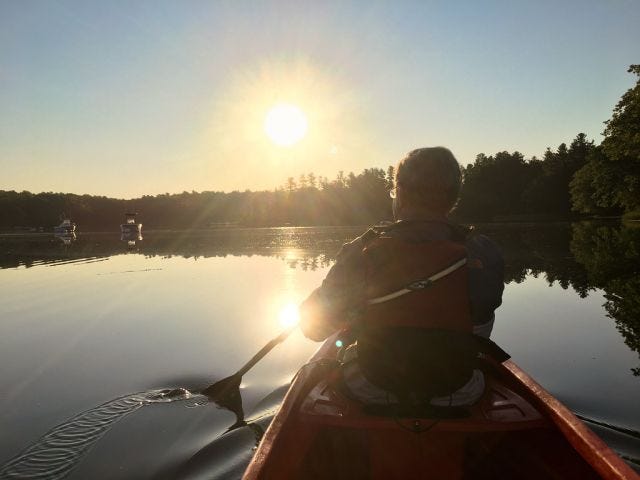RWL Newsletter #142 - going gentle, brain scans, & national security

Greetings from the University of New Hampshire and happy fall! We had a beautiful week up here, and I even got out on the water with my father. We went for a nice early morning paddle on the Oyster River this past Saturday. I’ll be putting the boats away for the winter soon, which always makes me sad, so I’m going to try to squeeze a few more paddles in before then. It’s one of my favorite things to do. One of the great things about landing here at UNH when I retired from the Army was that my dad had retired a few years before, and had moved to live in the next town over from Durham (where UNH is located). So after 23 years of seeing him just a couple of times a year, I can now just call him up and suggest something like going out on the water. Being in a place you love with people you love nearby is a pretty good starting point for a good life.
On to the links!
Read
What: Knowable, Going gentle - A sociologist explains how to get the most out of the final months of life
https://www.knowablemagazine.org/article/health-disease/2019/end-of-life-care
Why: We talked about long term care and hospice this week in my management class. I thought this short interview with sociologist Deborah Carr had some interesting points. For example, the idea of a "good" death is very modern, because death used to be fairly quick in pre-modern times. Also the idea of constructing a “post-self”, which is not at all new, though that is a clever new name for a legacy.
Watch
What: TEDxOrangeCoast,The most important lesson from 83,000 brain scans | Daniel Amen (15 min)
Why: The first thing that struck me about this video was Amen’s statement about how trauma can echo down through generations. Reflecting on my own family stories, as well as the family stories of friends, I know that is true. The second thing that struck me about this video was the idea that psychiatry could use brain imaging to guide therapy. I don’t know the specifics of Dr. Amen’s work, but it's an interesting fact that psychiatry is the only medical discipline that does not regularly look at the organ it is treating. I don’t know how the field comes down on the usefulness of brain imaging, but it seems reasonable to think that the individual variations would have an impact on treatment.
Listen
What: The President’s Inbox, Innovation and National Security, With Admiral William H. McRaven (30 min)
https://www.cfr.org/podcasts/innovation-and-national-security-admiral-william-h-mcraven
Why: The President’s Inbox is a podcast produced by the Council on Foreign Relations, the think tank that produced the journal Foreign Affairs, which you are probably familiar with if you follow international politics. This podcast is non-partisan, and the guests are often really remarkable individuals talking about serious issues without the yelling and jumping around that we see so much of in our domestic politics. Admiral McRaven had a storied career in the Navy as a SEAL and ultimately leader of US Special Operations Command, and oversaw, among other things, the Bin Laden raid. In this interview, McRaven discusses a new CFR-sponsored report on interaction between national security and innovation. As a retired Army officer and now educator, I am also interested in that interaction. There is a fair amount of discussion about competition with China, which is interesting, but also about the shrinking percentage of the Federal budget dedicated to supporting research and development.
Thanks for reading and see you next week! If you come across any interesting stories, won't you send them my way? I'd love to hear what you think of these suggestions, and I'd love to get suggestions from you. Feel free to drop me a line at mark.bonica@unh.edu , or you can tweet to me at @mbonica .
Also, if you find these links interesting, won’t you tell a friend? They can subscribe here: https://tinyletter.com/markbonica
Have a great weekend and do amazing things!
Mark
Mark J. Bonica, Ph.D., MBA, MS
Assistant Professor
Department of Health Management and Policy
University of New Hampshire
(603) 862-0598
mark.bonica@unh.edu
Health Leader Forge Podcast: http://healthleaderforge.org
"I know of no more encouraging fact than the unquestionable ability of man to elevate his life by a conscious endeavor." - Henry David Thoreau


